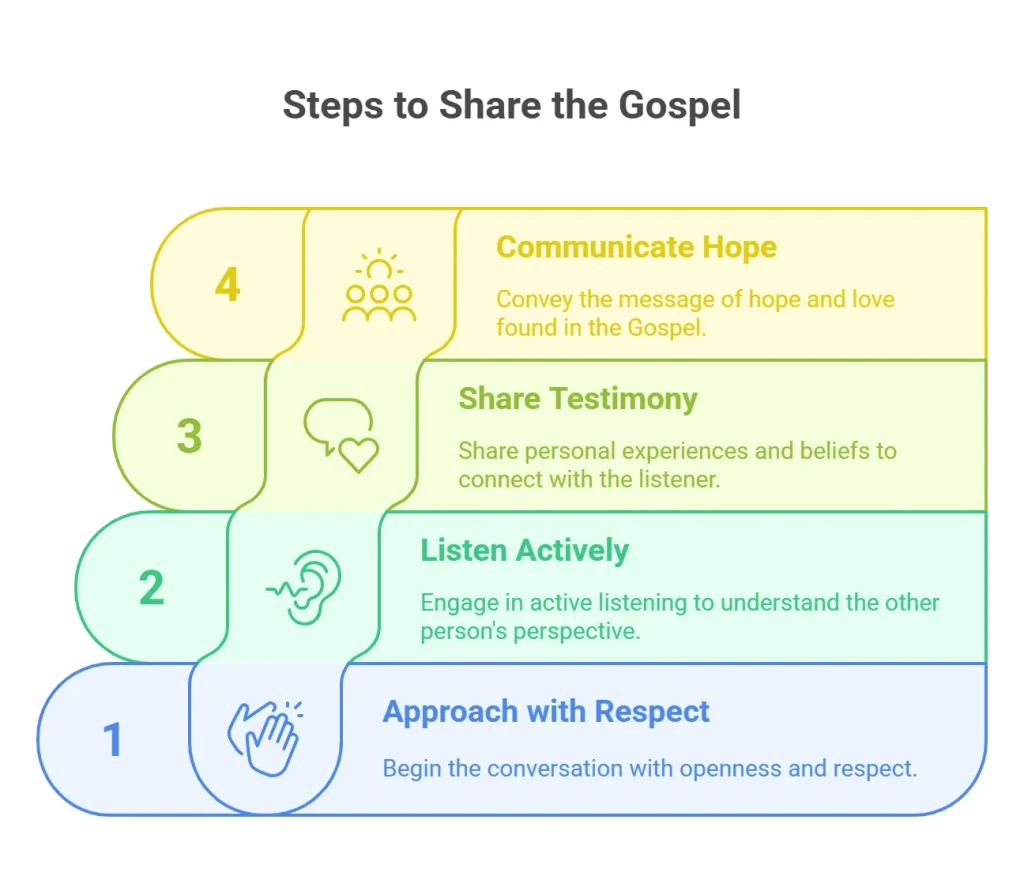How to Share the Gospel with a Stranger
Learning how to share the gospel with a stranger can transform everyday encounters into divine appointments. These brief conversations hold potential to introduce others to the life-changing message of Christ's love and redemption.
With thoughtful preparation and genuine compassion, evangelism becomes less intimidating and more natural. The effectiveness lies not in perfect presentations but in authentic connections that allow God's truth to resonate through your words and presence.
See also: Answering Your Child's Toughest Faith Questions
Preparation Before You Begin

Cultivate Your Own Relationship with Christ
Effective evangelism flows from an authentic relationship with Jesus. Greg Stier explains, "For years, they'd watched Him do just that—often by engaging strangers in spiritual discussions. They'd seen firsthand that the harvest was plentiful" (gregstier.org). Your personal faith journey provides the foundation for sharing with others.
Develop a Brief Personal Testimony
Create a concise (1-2 minute) version of your testimony focusing on:
- Your life before knowing Christ
- How you encountered Jesus
- The difference He's made in your life
As multiplyingdisciples.us suggests, "Develop a compelling and concise 15-Second Testimony to share your faith story confidently."
Know the Gospel Essentials
Be clear on the core gospel message:
- God's love and perfect design for humanity
- Our separation from God through sin
- Jesus's sacrifice to restore relationship with God
- Our response of faith and repentance
- The new life available through Christ
Beginning the Conversation

Pray for Divine Appointments
Before engaging strangers, pray specifically for God to guide you to receptive people. JonMark Baker notes, "Paul told us that his motivating force for evangelism was the love of Christ" (supernaturaltruth.com). Let this same love motivate your interactions.
Start with Genuine Connection
Begin with authentic interest in the person:
- Offer a sincere compliment
- Ask thoughtful questions about their life
- Find common interests or experiences
- Provide help if they need assistance
True evangelism starts with seeing people as individuals made in God's image, not as projects or targets.
Use Natural Conversation Bridges
Look for natural openings to shift toward spiritual topics:
- Current events with moral dimensions
- Comments about purpose, meaning, or fulfillment
- Holidays with religious significance
- References to church, faith, or spiritual matters
- Sharing about weekend activities
Moving to Spiritual Conversation

Ask Permission
Before shifting to deeper spiritual topics, respectfully ask:
- "Would you mind if I shared something that's made a significant difference in my life?"
- "I have a faith perspective on that; would you be interested in hearing it?"
- "Could I ask what your thoughts are about spiritual matters?"
This approach honors the person's autonomy and creates a more receptive atmosphere.
Listen Actively
Practice genuine listening skills:
- Give full attention (maintain appropriate eye contact)
- Ask clarifying questions
- Respect their perspectives even when different from yours
- Look for underlying concerns or needs
As multiplyingdisciples.us emphasizes, "Practice active listening and empathy to understand others' experience and needs."
When the moment feels right, share your personal testimony concisely, focusing on:
- Authenticity rather than perfection
- Relatable experiences
- The difference Jesus has made in your life
- Aspects that might connect with their situation
Presenting the Gospel Clearly

Use Simple, Clear Language
Avoid religious terminology that might confuse someone unfamiliar with Christianity:
- Instead of "sin," try "separation from God"
- Instead of "salvation," consider "restored relationship with God"
- Instead of "repentance," explain "turning away from self-centered living"
Utilize Simple Tools
Consider using straightforward evangelism methods:
- The 3 Circles (God's design, brokenness, gospel)
- Romans Road (using key verses from Romans)
- Before/After illustrations from your own life
RejoicingWithPurpose.com suggests: "Share the Gospel using the 3 Circles Tool to present God's design, brokenness, and the Gospel message in a clear and relatable way."
Address Common Questions
Be prepared for typical questions:
- "What about other religions?"
- "How can a good God allow suffering?"
- "What about people who've never heard about Jesus?"
Simple, honest answers that acknowledge complexity while affirming core truths are better than pretending to have all answers.
Inviting Response and Following Up
Extend a Clear Invitation
If the person seems receptive, offer a specific next step:
- "Would you like to begin a relationship with Jesus today?"
- "Could I pray with you about inviting Christ into your life?"
- "Would you be interested in exploring these ideas more?"
Respect Their Response
Honor whatever response they give:
- If positive, guide them in a simple prayer of faith
- If uncertain, offer to continue the conversation another time
- If negative, thank them for listening and leave the door open
Offer Practical Next Steps
For interested individuals, provide specific follow-up options:
- Exchange contact information
- Invite them to church or a small group
- Offer a Bible or introductory Christian book
- Suggest meeting again to discuss questions
Practical Tips for Various Settings
Public Places (Coffee Shops, Parks, etc.)
- Position yourself where conversation is natural (shared tables, public seating)
- Comment on shared experiences (weather, environment, events)
- Offer assistance when appropriate (holding doors, small favors)
Service Interactions (Stores, Restaurants)
- Be exceptionally kind and patient
- Express genuine appreciation for their service
- Leave gospel literature with a generous tip when appropriate
Travel Settings (Planes, Trains, Buses)
- Ask open-ended questions about their journey
- Listen attentively to their story
- Look for natural opportunities to share your faith perspective
Maintaining the Right Heart
Remember that effective evangelism combines truth with love. Sharing with strangers requires:
- Humility: Recognizing God does the convincing and converting
- Respect: Honoring others' freedom to respond as they choose
- Patience: Understanding that spiritual decisions often take time
- Authenticity: Being honest about your own journey, including struggles
- Dependence: Relying on the Holy Spirit's guidance throughout
As JonMark Baker reminds us, "Sharing the Gospel can be difficult… but [we can] overcome the awkwardness, and begin to share the Gospel in the power of God" (supernaturaltruth.com).
By preparing well, engaging authentically, communicating clearly, and respecting others' responses, you can share the life-changing message of Jesus naturally with strangers. Each conversation becomes not just a potential conversion moment but a faithful act of obedience to Christ's commission to share His good news with all people.
Leave a Reply

Related Posts